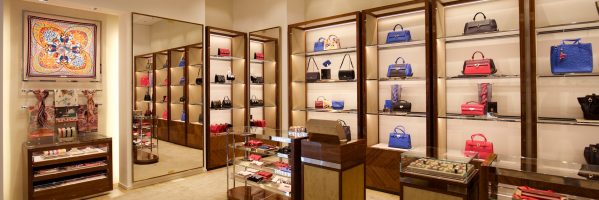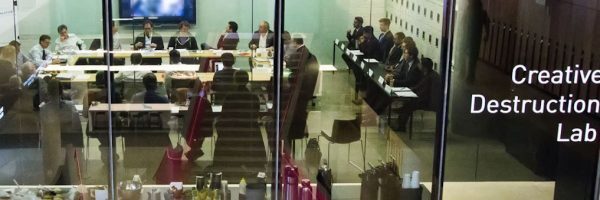Showdown: Find Out if You Should Get an MBA in New York City or Los Angeles

The battle for hip-hop supremacy may have ended in the ’90s, but we can keep the East Coast-West Coast beef alive while looking at full-time MBA programs in New York City and Los Angeles.
Both cities are home to top business schools and are ripe with employment opportunities in booming industries. But which is best for you? Let’s take a deeper dive.
Location
We’ll start with location, location, location.
The most bustling city in the country, NYC is is the capital of the business world. More Fortune 500 companies are headquartered here than in any other city. The city is not only home to Wall Street and the world’s largest financial institutions, but also some of the largest media, marketing, and advertising companies. While New York City can be daunting in its size, it’s also furiously expensive to live in, so it may not be for everyone. Getting to know the city’s vast public transportation system is a must and it can get pretty cold in the winter, so if you’re looking for beaches, keep reading.
Meanwhile, LA is Tinseltown. The city’s economy is driven by entertainment industries like television, film, video games, music recording, and production, but also by international trade, technology, petroleum, fashion, apparel, finance, telecommunications, and tourism. In the 2017 Global Financial Centres Index, Los Angeles was ranked as having the 19th most competitive financial center in the world, and sixth most competitive in United States. The city is also the largest manufacturing center in the western United States, with the ports of Los Angeles and Long Beach comprising the fifth-busiest port in the world and a vital trade route within the Pacific Rim.
New York City Full-Time MBA Programs
Full-time MBA Programs in New York City include:
- Stern School of Business – New York University
- Gabelli School of Business – Fordham University
- Columbia Business School
- Zicklin School of Business – Baruch College
What stands out about these programs?
A Columbia MBA opens up countless career options and is sure to pay off in the long run: The average starting salaries for Columbia MBAs is $104,000, with 37 percent of full-time MBA of graduates being employed in the financial services industry.
Meanwhile, Stern’s MBA curriculum gives students tons of flexibility, and allows degree seekers to choose one or two MBA specializations, NYU allows up to three specializations from 20 plus options.
Both Gabelli and Zicklin’s full-time programs feature cohort-based structures. Gabelli’s program features a New York immersion experience where, over the course of five days, students are exposed to a number of company visits with corporations like Deutsche Bank, Money.net, and Hewlett Packard. As an alternative to completing a major, Zicklin students may pursue a joint JD/MBA in conjunction with Brooklyn Law School or New York Law School.
Los Angeles Full-Time MBA Programs
Full-time MBA Programs in Los Angeles include:
- Anderson School of Management – UCLA
- Argyros School of Business – Chapman University
- Graziadio School of Business and Management – Pepperdine University
- Marshall School of Business – USC
- Peter F. Drucker and Masatoshi Ito Graduate School of Management – Claremont Graduate University
What’s special about these MBA programs?
Anderson features a Business Creation Option for MBAs, which gives students the chance to start their own businesses while still in school. Meanwhile, the Special Project Option challenges groups to tackle problematic issues that impact an entire industry.
Chapman’s full-time MBA curriculum features three main components—core/required courses, a capstone course, and elective courses. Students have several track options available to concentrate their studies, including: Corporate Finance, Marketing, Investment Management, Entrepreneurship, Information Systems in Digital Times, and more.
Graziadio full-time MBA students have the option to spend a trimester abroad in the fall term of their second year at one of Pepperdine’s partner universities in Africa, Asia, Europe, Latin America, or Oceania.
USC MBAs have required study-away coursework called PRIME International Experiential Learning, a 10-day site visit overseas. Students must complete industry—and company-oriented recommendations in capstone projects that incorporate concepts from global strategy and global economics.
At the Drucker School, students may choose two areas of concentration to focus their studies, and select elective within these areas of concentration. Concentrations are offered in: Strategy, Finance, Marketing, Leadership, Global Management, and Information Technology Management.
Jobs and Salary
When it comes to job placement, both New York and Los Angeles have their perks.
New York is home to business school with the highest job placement rate: Around 97 percent of Columbia Business School graduates receive offers within three months of graduation. The school’s class of 2016 boasted an average starting salary of roughly $125,000 plus a $25,000 signing bonus. The top three industries that employ Columbia graduates are financial Services (37 percent), consulting (35 percent) and technology/media (10 percent).
Check out a complete breakdown of NYC salaries and employment opportunities, give our guide to getting paid in New York a read.
While Silicon Valley has a reputation for being the prime place for MBA jobs in California, LA has been catching up recently—and fast. Los Angeles has embraced the tech boom in a big way, with many Valley bigwigs and new startups alike moving their operations to Silicon Beach. With that in mind, the new era of LA innovation is creating some lofty starting salaries, particularly for MBA graduates.
Recent UCLA Anderson graduates earned an average starting salary of $121,250 with a $25,000 signing bonus, according to statistics released by the school. The top five industries to employ Anderson MBAs are in tech (30.6 percent), financial services (21.6 percent), consumer products (13.4 percent), and consulting services (13.4 percent).
Check out our guide to the highest MBA salaries in Los Angeles for more information.
Made in Italy and NYU Stern: James & Salvatore Ferragamo

When it comes to Italian high-fashion, names like Gucci, Versace, and Prada often come to mind. These companies, known for their quality products and timeless brands, are staples in both the fashion and business communities. Salvatore Ferragamo S.p.A., another Italian fashion company, is notable for not only their quality leather and fine wine, but also for their leadership, namely twin brothers and NYU Stern School of Business MBA graduates James and Salvatore Ferragamo.
All in the Family
James and Salvatore followed the footsteps of their father and company CEO Ferruccio, and grandfather Salvatore, who founded the brand in 1928. The company’s current structure features each of the founder’s six sons and daughters with a role on the board of directors, with other relatives also taking jobs within the organization.
However, the Ferragamo clan decided that only three members from the family’s third generation should be involved in the family business. These three members were required to have a university degree, an MBA, three years of working experience outside of Ferragamo, and English and IT skills. James and Salvatore accepted this challenge: Both graduated from NYU’s Stern School of Business with a BS in 1993 and again with an MBA in 1997.
What have the two Ferragamo heirs and Stern MBA alumni been up to lately? Both have been utilizing their strengths to push the Ferragamo brand to new heights in different ways.
Expanding “Made in Italy”
James is currently the Director of Women’s and Men’s Shoes and Leather Goods for the Salvatore Ferragamo Group. His responsibilities include overseeing all categories from bags to belts, with a focus on shoes. He briefly worked at Goldman Sachs before completing his MBA in 1997 and joining the family business. James was the first member of the third-generation Ferragamo’s to enter the business.
According to James, a big part of innovation is collaboration. Since 2010, all leather goods collections have been created side by side with the brand’s creative director, Massimiliano Giornetti. Together, James and Massimiliano have pushed Ferragamo into modern territory, while still respecting the brand’s heritage.
YOU MAY ALSO LIKE: Supply Chain Management MBAs: The Best New York Programs
“Together, we need to communicate Ferragamo’s creativity,” James told the South China Morning Post. “For Massimiliano, he pushes on the accelerator of creativity and creates novelty with the ready-to-wear. My role is to try and make sure that we have quality and never compromise on it.”
Ferragamo has always prided itself on being “Made in Italy” and James says that will remain the brand’s headlining message, even as it expands into new markets like China. “No matter what, all our products will always be made in Italy,” he said, doubling down on his decision to keep all production inside of Italy in the near future. “My father had a very rigid point of view on this. Italy, to us, represents a certain uniqueness, and people love this idea of artisanship.”
Resurrecting Il Borro
Instead of following the career trajectory of the rest of his family, Salvatore followed his true passion: wine.
“[My brother James] likes fashion, and I like wine, so it worked out perfectly,” Salvatore told The Drinks Business.
Since graduating from Stern’s MBA program in 1997, Salvatore has been tasked with expanding Ferragamo’s brand portfolio into wine and agro-tourism at Il Borro villa. The Ferragamo family purchased the Tuscan vineyard in 1993 and Salvatore has led efforts to restore the estate and innovate the wine production business, while always sticking to the family’s commitment to being “Made in Italy.”
“Fashion and wine are both a question of lifestyle, personal taste, and sensibility,” Salvatore told Wine Enthusiast. “When I was growing up, I was surrounded by a spirit of fine craftsmanship and careful attention to details that are the hallmarks of ‘Made in Italy.’ My family has always believed that this approach is the best way to express creativity, tradition and quality, and it’s true in both fashion and wine. For example, all of the grapes that go into our wines are carefully chosen by passionate hands that give each bottle its own character.”
In September, Salvatore revealed that Il Borro is producing an amphorae wine made with Sangiovese with the skins kept in contact with the clay vessel for one year. The clay is sourced locally and is made by a local amphorae maker. The wine “Unlike French oak, amphorae doesn’t give the wine notes of tobacco or spices, it focuses more on the fruit notes of the wine,” he said. Salvatore added that he is also experimenting with “a secret project” — a Chardonnay made with the same method.
Reflecting on NYU Stern
In 2006, James and Salvatore invited a group of Stern alumni to their flagship Fifth Avenue store. At the event, the Ferragamo twins were asked how studying at NYU Stern and working in New York helped them as they entered the business world.
“NYU helped me to balance my professional experience with my academic experience,” James said. “Living and working in New York City provided the opportunity to understand the practical application of what I learned, as both a graduate and an undergraduate, whether it was about finance, fashion, marketing, or advertising.”
“Studying in New York gives you the unique opportunity to learn in the business capital of the world and to be in contact with people from different countries, cultures, and businesses,” Salvatore said. “This is very important as I am promoting Il Borro estate worldwide, and it is crucial to understand, recognize, and respect different cultures when entering into any type of global business relationship.”
Fashion and Future at Stern
Recently, alongside the new Tech MBA, the Stern School of Business introduced the forward-thinking Fashion & Luxury MBA, which features several high-profile figures on its advisory board from the likes of Dolce & Gabanna, Tiffany & Co., Nike, Vogue and more.
For more information on the NYU Fashion & Luxury MBA, click here.
NYU Stern Receives $8 Million Alumni Gift to Promote Technology, Business, and Innovation

This week, NYU Stern School of Business announced the development of a new center to serve as a hub for cross-disciplinary collaboration and technology innovation. The new Fubon Center for Technology, Business, and Innovation was made possible thanks to an $8 million donation from alumnus Richard Ming-Hsing Tsai (MBA ’81). Tsai is chairman and CEO of Fubon Financial Holding Co., Ltd. and Fubon Life Insurance Co., Ltd. He is also vice chairman of Taiwan Mobile Co., Ltd.
The Fubon Center will support and facilitate collaboration in areas such as fintech, business analytics, technology, and entrepreneurship. It will also serve as a new nexus for continuous innovation at NYU Stern by strengthening industry ties and promoting cutting-edge research. Additionally, the Fubon Center will help to shape future coursework and encourage academic collaboration between NYU Stern and National Taiwan University, Tsai’s undergraduate alma mater.
“Technology demands that companies, regardless of industry, be nimble, adapt, and innovate at an unprecedented rate,” Stern Dean Peter Henry said in a press release.”Thanks to the generosity and inspiration of our alumnus Richard Tsai, we can help transform these challenges into exciting opportunities, staying as relevant to the new economy as we are to Wall Street.”
The new Fubon Center isn’t the only initiative that has been established over the last 18 months at Stern. In 2014, the school delivered one of the first courses on blockchain, which eventually led to the creation of the MBA FinTech specialization in 2016. Then, this past May, Stern launched a new Tech MBA, a one-year specialized MBA program focused on business and technology. It offers experiential learning projects with companies through Stern Solutions Programming. These initiatives and others are all part of Stern’s latest mission to expand its offerings at the intersection of business and technology.
To learn more about what NYU Stern is doing in the technology and business space, visit the school website.
ICYMI–Stern’s advances in technology education and career placement were also featured in this recent Clear Admit story: “More Top Business Schools Training MBA Students for Careers in Tech.”
This article has been edited, updated, and republished on our sister site, Clear Admit.
Supply Chain Management MBAs: The Best New York Programs

Product outsourcing is a hot topic today. Consequently, the supply chain management field is richer, more complex, and more necessary than ever. Optimizing the process of turning a concept into a product and getting that product to the shelf is integral to the success any retailer. No matter where a product is made, the progression from conception to end user is a collaborative effort. An MBA in supply chain management can help you learn who to contact and how to strategize in order to best serve both retailers and consumers.
New York City is among the retail capitals of the world. Schools in the New York metro have easy access to hundreds of CEO speakers, as well as a deluge of internship and job opportunities. Below, we’ve outlined some of our favorites.
The Best NYC Supply Chain Management MBA Programs
Columbia Business School
Though Columbia Business School does not offer concentrations, it would be remiss not to mention this academic powerhouse when considering programs with resources in supply chain management education. Columbia’s supply chain management courses are taught by extraordinarily well-regarded professors, who may serve as resources for students throughout their time at the school. Medini R. Singh, for example, is a sought-after professor. In addition to his 25+ years of teaching experience and numerous teaching awards, Singh serves on the advisory board for the W. Edwards Deming Center for Quality, Productivity, and Competitiveness. According to his bio, Singh’s research focuses on “service and supply chain design, at both the tactical and strategic level.” Singh has also consulted for multiple Fortune 500 companies. Columbia students MBAs will also have access to Awi Federgruen, the Charles E. Exley Professor of Management and Chair of the Decision, Risk and Operations Division of Columbia Business School. Federgruen has published over 120 pieces on the financial services industry, and often consults on supply chain management issues for large corporations.
Rutgers Business School, Newark and New Brunswick
Rutgers Business School offers a Supply Chain Management MBA, the mission of which, according to the website, is to “prepare students to meet and exceed the expectations of the employees experiencing a growing demand for supply chain management and logistics experts.” In fact, the school’s Supply Chain Management program was ranked eleventh on U.S. News & World Report’s 2016 list of best graduate schools for business. This ranking seems apt, considering a whopping 100 percent of the supply chain management MBA students from the class of 2016 were employed within 90 days of graduation. Students of this program have gone on to work various supply chain management jobs at companies like Este Lauder, Colgate, and Johnson & Johnson.
CHECK THIS OUT: Looking At New York City’s Best MBA Return on Investment (Pt. I)
Stern School of Business—New York University
The renowned New York University Stern School of Business provides students with the option of choosing a Supply Chain Management and Global Sourcing Concentration to equip MBAs to navigate supply chain issues in a global economy. Students who pursue this concentration can take classes like Global Sourcing and Open Innovation, Pricing Strategies, and Building and Managing Customer Relationships. Stern gears the specialization toward students aiming to pursue careers in management consulting, managing information systems, product management, and supply chain management. Students in this program can choose two of three core supply chain management courses, and then must take six of the 24 related elective courses.
Gabelli School of Business—Fordham University
The Gabelli School of Business at Fordham University offers many classes that specialize in supply chain management, including Operations Management. Under chair Sarah Jinhui Wu, the Gabelli Operations Management courses “equip students with a solid understanding of core operations concepts and decisions, rigorous analytical thinking and skills, and a creative mindset so they can deal with all of the complex issues of a supply chain.”
Many of the other concentrations offered in the Gabelli School of Business MBA program also offer courses revolving around supply chain management, including Global Sustainability.
Inside the University of Toronto’s Creative Destruction Lab

The Creative Destruction Lab (CDL) at the University of Toronto Rotman School of Business is a seed-stage program created exclusively for scalable science-based companies. Launched in 2012, this program employs objectives-based mentoring to help maximize equity value creation for its ventures. The lab is best suited for early-stage companies, particularly those with links to university research labs.
The Creative Destruction Lab Program
The CDL is a nine-month program that employs a coaching process to help business founders commercialize their advances in science and technology. There are four main elements of the program:
- Mentorship: The founders work alongside select entrepreneurs and angel investors in intensive full-day sessions to assess their business progress and to set short-term objectives.
- Investment Opportunities: Founders have the chance to raise capital in meetings with entrepreneurs, angel investors, and partners from leading venture capital firms.
- Technical Feedback: The founders receive advice on their technical road maps and objectives from world-renowned experts at leading academic institutions.
- Business Development Support: Finally, the founders are able to work with MBA students to develop their financial models, evaluate potential markets, and fine-tune their strategies for scaling.
“The breadth and depth of insight that we were given access to was phenomenal,” said participant Karl Martin, founder of Nymi, a wearable technology firm in the healthcare space.
CDL Locations
Unlike many seed-stage programs, CDL has centers in five locations across Canada. Each location focuses on a specific stream of ventures and offers specific resources.
- Calgary: Working with the Haskayne School of Business, the Calgary location focuses on a few key research pillars including energy innovations, human dynamics, engineering solutions for health, new earth-space technologies, and other areas.
- Halifax: The Halifax location leverages the Rowe School of Business at Dalhousie University and fosters “blue-green” technology—focused on agri-tech, bioproducts, and environmental technology—and “prime” technology, including startups tackling problems in healthcare, finance, energy, chemical, media, transportation, and agriculture.
- Montreal: In partnership with HEC Montréal, the Montreal location focuses on startups using artificial intelligence and data analysis technologies.
- Toronto: The main location in Toronto, run alongside the Rotman School of Management, focuses on three types of startups. The first is “Prime” startups tackling problems in healthcare, finance, energy, chemical, media, transportation, and agriculture. Meanwhile, Quantum Machine Learning startups are grounded in physics, math, statistics, machine learning, electrical engineering, and/or quantum computing. Finally, massively scalable Artificial Intelligence/Machine Learning startups focus exclusively on artificial intelligence and machine learning.
- Vancouver: Located in Vancouver, this location operates in partnership with the Sauder School of Business at the University of British Columbia. It focuses on startups in the “Prime” stream as well as those in BioMedTech, including chemical, biological, and medical ventures.
Partnership with NYU Stern to Expand CDL to New York
And, beginning on September 1, 2018, the Creative Destructive Lab will partner with the NYU Stern School of Business to establish its first lab outside of Canada. The newest location will bring Stern faculty and MBA students alongside angel investors, serial entrepreneurs, and founders of pre-seed stage startups in science and technology. CDL New York will begin accepting applications in January 2018 and expects to admit around 25 ventures the first year.
“Our model for developing massively scalable science-based ventures has proved successful in Canada. And we anticipate it will be similarly successful for our partners at NYU,” said Ajay Agrawal, a Rotman entrepreneurship professor and the founder and academic director of the lab, in a recent news release about the expansion.
New Program Executive Director
In other news, Rotman chose Sonia Sennik to be the inaugural executive director of the Creative Destruction Lab and its national network of programs. Sennik will be responsible for the lab’s oversight and coordination as well as its strategic operational and programmatic leadership.
As a recent graduate of Rotman’s Executive MBA program, Sennik is uniquely positioned for her new role. She was the inaugural recipient of the Rotman Social Impact Award and excelled in leadership during her time in the program. She’s also held senior project and engineering management roles at HATCH, a global engineering consultancy.
Of Sennik’s appointment, Agrawal said in a news release: “The Creative Destruction Lab is expanding rapidly, both geographically and programmatically. Sonia will provide leadership, vision, and energy to help ensure the success of the Lab and its ventures in the coming years.”
Graduates of CDL
Over the years, the Creative Destructive Lab has had many graduates, including:
- Thalmic Labs (Waterloo): Thalmic Labs develops revolutionary wearable technologies that explore the future of human-computer interaction.
- Atomwise (San Francisco): Atomwise is a Deep Learning technology designed for novel small molecule discovery to help develop better medicines faster.
- Deep Genomics (Toronto): Deep Genomics creates life-saving genetic therapies including a biologically accurate data- and AI-driven platform that supports geneticists, molecular biologists, and chemists.
- Kyndi (Palo Alto): Kyndi incorporates advanced artificial intelligence and symbolic natural language understanding to help knowledge workers process and consume vast amounts of information in order to better make critical decisions.
- Heuritech (Paris): Heuritech bridges the gap between social media and commerce with cutting-edge deep learning technology that detects emerging product buzzes online.
To learn more about the Creative Destructive Lab, including information about applying, visit the main CDL website.
This article has been edited and republished with permissions from Clear Admit.
Looking At New York City’s Best MBA Return on Investment (Pt. I)

As real estate in all five boroughs continues to rise, and/or get snapped up by oh-so-wonderful oligarchs, New York City’s pressure cooker reputation has taken a turn for the … banal.
